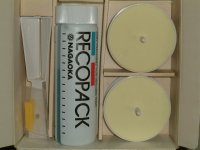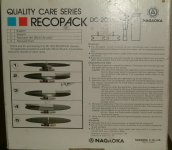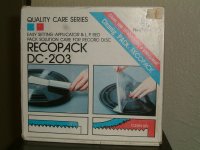It looks very similar to a method published several years ago in Audio Amateur. Reg Williamson used polyvinyl alcohol, if I remember correctly, to make the film. You can still buy the stuff from Old Colony:
KM-9 - Reg's LP Rejuvenator Kit
Never tried it myself.
KM-9 - Reg's LP Rejuvenator Kit
Never tried it myself.
Yeah. Way back in the eighties I used a similar product by Nagaoka (I later found the same product under another brand, maybe no-name). Same colour, too. I bet these design engineers were actually "engineering in reverse".
Dunno how someone can go on national TV and claim invention of a decades-old product.
Dunno how someone can go on national TV and claim invention of a decades-old product.
I bought 'Metrosound"s brush on-peel off mask in about 1980, and discovered it was indistinguishable from PVA Release Agent (except colour) as sold by fibreglass shops, at 5% of the price. I've been using release agent ever since.
Hey! Thanks for the tip! I think I'll give that a bash.
I've used the PVA stuff as sold by Old Colony, and it works quite well. Downsides are, you have to "cook" the stuff up to prepare it (if you get the kit), and takes many hours to dry (usually overnight) before you can peel it off. Upsides are it lasts a long time and seems to cover a lot of surface area. I'm still using the first batch I cooked up over 20 years ago! I usually use water and enzyme based cleaners though, because I can do more records in the same amount of time.
Neither method will completely clean a really dirty record though ("remove all clicks and pops"), you'll have to use multiple cycles of both to do a good job.
Neither method will completely clean a really dirty record though ("remove all clicks and pops"), you'll have to use multiple cycles of both to do a good job.
I tried it. It was not able to completely clean up a record that had apparent fungus and oily contaminants. My DIY RCM that uses isopropyl alchohol/distilled water/dishwashing liquid does a thorough job of this. It does clean up dusty records rather well, though.
BTW, the patent contains details of the formula.
BTW, the patent contains details of the formula.
Glad I found this thread. I was looking into various alternatives to clean my vinyl records. For years, I have been using the good old warm water/soap method and i've been succesful in bringing back hundreds of old cruddy disks from flea markets. I've been collecting since 1980 and have nearly 2500 vinyls.
My current technique involves a small piece of deer skin shammy, some ivory soap and very warm running water from the tap. "Gasp! what about soap film and minerals from water?" The soap i use doesn't leave any film (or not much) and the water in my neighborhood is pretty soft. I rince the vinyl on both sides at first, then I lather my hands and the piece of shammy and rub both surfaces thoroughly in concentric circles for a while (depending on the level of "crudiness") and I rince thoroughly on both sides until the water runs off the surface. Then I wiggle the disk until it has almost no water droplets on it and i pat poth sides lightly with a scott towel.
Then I just leave the disk to dry on top of a bottle of beer. Labels are rarely affected since the labels are pressed onto the molten vinyl and the glossy ones usually repel water, the matte ones absorb a little bit but dry off quickly. The result is truly day and night compared to a dusty disk found in the dollar bin or at flea markets.
But several of my friends were recommending various mixtures of distilled water, isopropanol and photo "wetting" agents... I've always been apprehensive using some of the suggested concoctions. Perhaps i'll try the mixture in post #12 on a recent batch of albums I haven't had the time to listen to (and clean up) yet.
Robert
My current technique involves a small piece of deer skin shammy, some ivory soap and very warm running water from the tap. "Gasp! what about soap film and minerals from water?" The soap i use doesn't leave any film (or not much) and the water in my neighborhood is pretty soft. I rince the vinyl on both sides at first, then I lather my hands and the piece of shammy and rub both surfaces thoroughly in concentric circles for a while (depending on the level of "crudiness") and I rince thoroughly on both sides until the water runs off the surface. Then I wiggle the disk until it has almost no water droplets on it and i pat poth sides lightly with a scott towel.
Then I just leave the disk to dry on top of a bottle of beer. Labels are rarely affected since the labels are pressed onto the molten vinyl and the glossy ones usually repel water, the matte ones absorb a little bit but dry off quickly. The result is truly day and night compared to a dusty disk found in the dollar bin or at flea markets.
But several of my friends were recommending various mixtures of distilled water, isopropanol and photo "wetting" agents... I've always been apprehensive using some of the suggested concoctions. Perhaps i'll try the mixture in post #12 on a recent batch of albums I haven't had the time to listen to (and clean up) yet.
Robert
Hello,
Before applying on the vinyl, just take a few drops of the solution on a watch glass and let it dry. The right mix should not produce any film/mark on the glass. If the Photo-Flo solution is not available, try using the 'Wurth Windshield Wash Additive', which is also very effective.
Best regards,
Bins.
Before applying on the vinyl, just take a few drops of the solution on a watch glass and let it dry. The right mix should not produce any film/mark on the glass. If the Photo-Flo solution is not available, try using the 'Wurth Windshield Wash Additive', which is also very effective.
Best regards,
Bins.
I bought 'Metrosound"s brush on-peel off mask in about 1980, and discovered it was indistinguishable from PVA Release Agent (except colour) as sold by fibreglass shops, at 5% of the price. I've been using release agent ever since.
Is this the stuff?
Martin
This kind of cleaning has been around a while, with different materials used. Cal brought it up, but here's a forum worth reading:
Wood Glue as Vinyl Cleaner - AudioKarma.org Home Audio Stereo Discussion Forums
Complete with some pre and post audio clips. This is presented by DIY types and not a for-profit seeking their bottom line.
I've been testing the glue verion out, and it does do some good, deep cleaning. But it alone isn't a miracle. Sometimes you just need time with a good record cleaning machine, as pointed out in the audiokarma thread.
Note that all such methods require a big time commitment. Applying it takes a good 15 minutes at least (to do it well and without a mess). Then there's the 6-8 hour wait. While I haven't tried the commercial versions, the glue version can take a LONG time to remove - particularly without leaving traces behind.
For the glue method, IMHO the blue masking tape is essential to aid the release procedure but that takes some time to do well without contacting signal grooves, AND it will leave some tape residue
Removal of the dried glue/release agent is not always easy either. If you wait too long glue becomes brittle and won't remove properly. If you peel too early, before it fully sets, it will tear and leave a mess of glue behind. In both cases, the solution is to apply more material/glue, usually back to the lead-in or run-out grooves where you've applied yet more release tape.
Note, finally, that some clicks and pops are, in fact, damage to the grooves, and these won't be removed by any of these materials. I have a 4th pressing Please Please Me with a big scratch - nay gouge - on side 2 (which means I consider it worthy of some testing) and MOST of the noise (including the big gouge) has yet to be removed. Haven't looked through a scope, but I assume it's just scratches and not dirt.
YMMV
Carl
PS - Bonus - if you get a really good peel, you can use it to listen to SGT Peppers and Revolution #9 backwards all the way through. Turn me on dead man...
Wood Glue as Vinyl Cleaner - AudioKarma.org Home Audio Stereo Discussion Forums
Complete with some pre and post audio clips. This is presented by DIY types and not a for-profit seeking their bottom line.
I've been testing the glue verion out, and it does do some good, deep cleaning. But it alone isn't a miracle. Sometimes you just need time with a good record cleaning machine, as pointed out in the audiokarma thread.
Note that all such methods require a big time commitment. Applying it takes a good 15 minutes at least (to do it well and without a mess). Then there's the 6-8 hour wait. While I haven't tried the commercial versions, the glue version can take a LONG time to remove - particularly without leaving traces behind.
For the glue method, IMHO the blue masking tape is essential to aid the release procedure but that takes some time to do well without contacting signal grooves, AND it will leave some tape residue
Removal of the dried glue/release agent is not always easy either. If you wait too long glue becomes brittle and won't remove properly. If you peel too early, before it fully sets, it will tear and leave a mess of glue behind. In both cases, the solution is to apply more material/glue, usually back to the lead-in or run-out grooves where you've applied yet more release tape.
Note, finally, that some clicks and pops are, in fact, damage to the grooves, and these won't be removed by any of these materials. I have a 4th pressing Please Please Me with a big scratch - nay gouge - on side 2 (which means I consider it worthy of some testing) and MOST of the noise (including the big gouge) has yet to be removed. Haven't looked through a scope, but I assume it's just scratches and not dirt.
YMMV
Carl
PS - Bonus - if you get a really good peel, you can use it to listen to SGT Peppers and Revolution #9 backwards all the way through. Turn me on dead man...

The "1 liter of alcohol" in your recipe is interesting. Is this readily available?
The question is... what type of alcohol?
The question is... what type of alcohol?
Often they use Isopropyl Alcohol in vinyl cleaning liquid.
The simplest I've used is a ( dilute) mixture of Isopropyl Alcohol + a few drops of liquid dish washer + a few drops of glass cleaner liquid ( has some ammonia ). I let it stay at least 10 to 15 minutes before scrubbing it out with a fine hair 'vinyl cleaning' brush. You need to ensure that you rub the disc a couple of times in between to ensure that the surface doesn't dry up.
Wash off with a strong water spray from a tap directed at an angle to the surface. This hopefully pushes any solid matter out of the groove. Last rinse is with distilled water and dried with a lint free cloth.
After several minutes of air drying it is again brushed with another disc cleaning brush which is 'very slightly' moistened with distilled water. It then goes into a ' new' record sleeve ! Some old albums sound cleaner than I've ever heard them to be!
Last edited:
- Status
- This old topic is closed. If you want to reopen this topic, contact a moderator using the "Report Post" button.
- Home
- Source & Line
- Analogue Source
- New vinyl cleaning method invented


